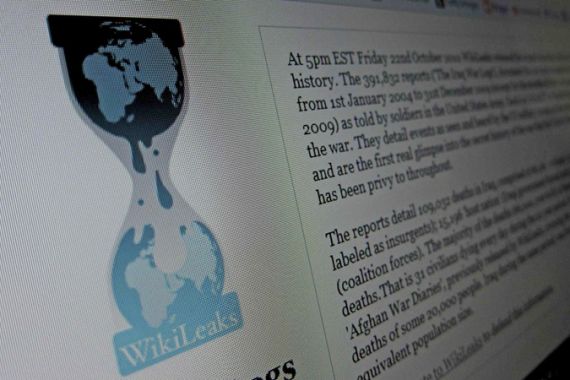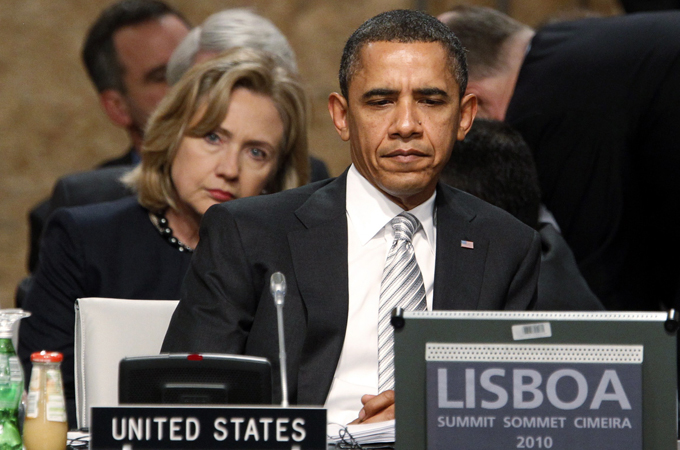Secret US embassy cables revealed
Documents detail calls for an attack on Iran, claims of US spying at the UN and widespread criticisms of world leaders.

 |
| The US state department has worked to contain the potential fallout from the secret diplomatic cables [Reuters] |
The whistleblowing website WikiLeaks has released a massive trove of leaked US diplomatic cables detailing candid opinions of various world leaders, repeated calls for a US attack on Iran, and requests for US diplomats to spy on officials of other countries.
WikiLeaks started publishing the 251,287 cables – 15,652 of which are classified “secret” – from 274 US missions around the world on Sunday, even after its website apparently came under a denial of service attack before the release.
The cables, communications between diplomatic missions abroad and the US state department in Washington, were mostly sent between 2007 and last February and could embarrass both the US administration and foreign governments.
| Diplomatic niceties | |||||||||||
|
Some of the diplomatic notes detailed how Arab leaders in the Gulf have been urging an attack on “evil” Iran, while others reveal serious fears in Washington over the security of Pakistan’s nuclear weapons programme.
They also detail advice given to US diplomats on how to gather intelligence and pass information of interest over to the country’s spy agencies. According to documents, senior UN figures were the target of intelligence gathering by US diplomats.
In an introduction to the documents on its website, WikiLeaks attacked “the contradictions between the US’ public persona and what it says behind closed doors”.
“The cables show the extent of US spying on its allies and the UN; turning a blind eye to corruption and human rights abuse in ‘client states’; backroom deals with supposedly neutral countries; lobbying for US corporations; and the measures US diplomats take to advance those who have access to them.”
The White House has described the leaks as “reckless and dangerous”.
“To be clear – such disclosures put at risk our diplomats, intelligence professionals, and people around the world who come to the United States for assistance in promoting democracy and open government,” Robert Gibbs, the White House press secretary, said in a statement.
But Julian Assange, the founder of WikiLeaks, denied that any of the documents placed individuals at risk.
“As far as we are aware, and as far as anyone has ever alleged in any credible manner whatsoever, no single individual has ever come to harm as a result of anything that we have ever published,” he said on Sunday.
‘Public interest’
The New York Times newspaper, which received the documents before their release by WikiLeaks, explained its decision to publish the cables by saying they “serve an important public interest”.
The newspaper said it had “taken care to exclude… information that would endanger confidential informants or compromise national security.”
It said it had notified White House officials of the cables and asked if other information should be redacted, adding that it “agreed to some, but not all” of their suggestions.
The UK’s Guardian newspaper said all five papers that gained early access to the documents had decided “neither to ‘dump’ the entire dataset into the public domain, nor to publish names that would endanger innocent individuals”.
US officials took the unusual step on Saturday of sending a letter to WikiLeaks to warn against the release of the secret government documents, which it says will put “countless” lives at risk.
The letter, from Harold Hongju Koh, the US state department’s most-senior lawyer, argued that publishing the classified files would threaten counterterrorism operations and jeopardise US relations with its allies.
The cache of documents contains allegations of corruption against foreign leaders, who are subjected to stinging criticism in the cables, with Vladimir Putin, the Russian prime minister, referred to as an “alpha-dog.”
Angela Merkel, the German Chancellor, “avoids risk and is rarely creative”, and Hamid Karzai, the Afghan president, is described as being “driven by paranoia”, in comments contained within diplomatic dispatches.
Advisers to Recep Tayyip Erdogan, the Turkish premier, also come in for criticism for having “little understanding of politics beyond Ankara”.
US diplomats visited foreign ministries in the days before the release hoping to stave off anger over the cables, which are internal messages that often lack the niceties diplomats voice in public.
‘Diplomatic brouhaha’
Steve Clemons, a political strategist and director of the American Strategy Programme at New America Foundation, told Al Jazeera that the US reaction to this latest round of leaks has been stronger than in the past because of mainly diplomatic concerns.
“Certainly I wouldn’t take it to the level of lives lost on the battlefield. This is essentially diplomatic brouhaha,” he said.
“I think also that the content of these documents is a lot about the gossip and innuendo and the nuance … and there are going to be a lot of embarrassing things that come out of these documents.
“There will be political repercussions of the way foreign leaders are going to read these documents. And in that sense, you’re going to see people, ranging from [Asif Ali] Zardari in Pakistan, to, I understand, Nelson Mandela of South Africa has had some bad swipes taken at him in these cables.”
WikiLeaks previously published 400,000 Iraq war documents in October, the biggest leak to date in US intelligence history, and 77,000 classified US files on the Afghan conflict in July.